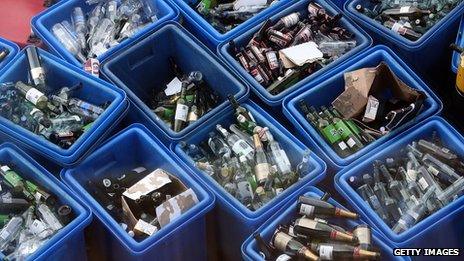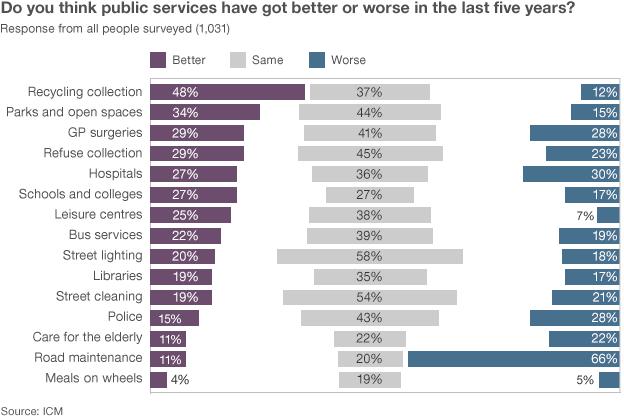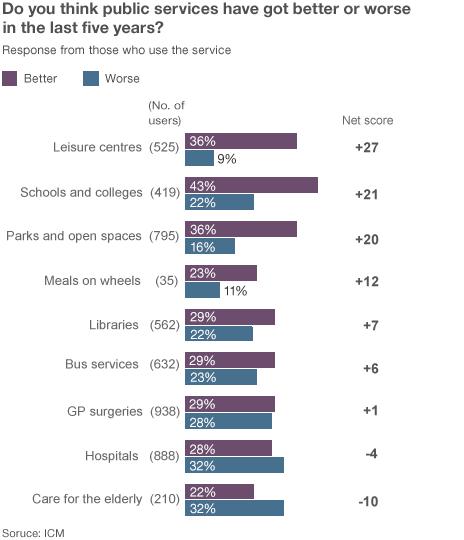Public service cuts – did we notice?
- Published

Recycling was identified by more people than any other service as having improved
Many people in the UK think the quality of public services overall have been maintained or improved in the past five years despite government cuts, a poll for the BBC suggests.
More of the 1,031 people surveyed feel bin collections, parks and libraries, schools and bus services have improved than those who think they are worse.
But the responses indicate people think the quality of elderly care, hospitals, police and road maintenance is lower.
Councils say funding remains a concern.
The Local Government Association says overall the results are testament to the resilience of councils, but says that unless finances become sustainable, satisfaction levels will decline.
It is five years since the bail-out of the banks marked a new era of austerity in Britain amid warnings that deep cuts to state spending would see the standard of public services plunge.
But today's poll by ICM, external suggests six out of 10 people think service quality has been maintained or improved.

With recycling for instance, 12% think it has got worse, but 48% think services are better, giving a score of plus 36 percentage points.
There are positive responses for the quality of many other services too. Parks and open spaces score plus 19; leisure centres plus 18.
Bus services score plus two overall but there are big regional variations.
In Scotland, bus services score minus 20 - suggesting people think they have got worse, while in the south-east of England they score plus 22.
While general public opinion may tend towards the view that a service has been maintained or improved, some will argue that cuts in spending have had a particularly negative impact on vulnerable groups whose experience may not be represented by the poll.

However, the survey indicates that people who use a particular service are more likely to say it has got better than the general population.
For instance, the overall score for meals-on-wheels is minus one - a slightly higher proportion think they've got worse than better. But among service users, the figure jumps to plus 12.
With schools it is a similar story: Plus 10 among the whole survey sample, but plus 21 among parents of school-age children.
And libraries - the subject of many anti-cuts protests - three per cent more people say they've got better than worse, but among library users the score is plus seven.
Professor Tony Travers of the London School of Economics says the results will be seized upon by the Treasury as evidence that forcing local authorities to focus on frontline services can lead to an improvement in standards.
"Ministers are likely to use this poll to argue for further cuts," he says.
Despite the government protecting NHS budgets, hospitals score minus three and care for the elderly minus 11.
The biggest concern is pot-holes - road maintenance scores minus 55.
Sir Merrick Cockell, chairman of the Local Government Association says: "It is unsurprising that the cracks are starting to appear in public satisfaction around the state of our roads and elderly care.
"A shortage of funding and increasing demand is making it impossible to maintain adult social care services at current levels let alone to try and raise standards of care while our roads are crumbling under a £10.5bn repair backlog caused by decades of underinvestment.
"Unless local government finance is put on a sustainable footing, these figures will only head in one direction as the noticeable impact of cuts to services becomes a reality for all residents."
A Department for Transport spokesman said: "Councils have been given billons by the government to fill potholes on local roads and the public expects them to use that money."
The government will argue that the poll findings vindicate their determination to streamline public services.
Only last week, Prime Minister David Cameron told the BBC: "We have demonstrated in government that you can make reductions but improve services."
Local Government Minister Brandon Lewis said: "This survey shows that in many areas such as rubbish collections, schools and libraries, services and value for money are improving, illustrating how councils can both deliver sensible savings and protect the frontline.
"But some councils are making lazy choices due to their failure to get a grip on cutting waste and inefficiency."